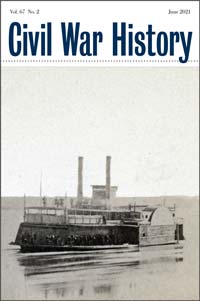June 2021, Volume 67, No. 2
Mar 2nd, 2021Elusive Victory: The Union Navy’s War along the Western Waters
by Robert Gudmestad
The Union’s Mississippi Squadron fought an unconventional war against southern soldiers, guerrillas, and civilians who attacked northern supply lines. Under the direction of David D. Porter, the squadron used a strategy of exhaustion to wear down Southern resistance but could never fully defeat its foe. Northern sailors hated their service in the brownwater navy and viewed their time in the war as transactional in nature. The fleet underwent a massive turnover in 1864, but the North used its advantages in economics, technology, and population to compensate for a fleet of sailors who lacked motivation and discipline. While the Union did not defeat its foe along the western waters, it provided enough protection to the logistical network to assist in victory on the battlefield.
Cannibals, Gorillas, and the Struggle over Radical Reconstruction
by Daniel P. Kilbride
Antebellum racism did not doom the Reconstruction project of black citizenship to failure. In the 1850s, a flood of African travel accounts captivated Anglo-American readers. These appeared at an opportune time for Northerners committed to granting citizenship to 4 million newly emancipated slaves. Together with the glorious record of black military service, these books proved that people of African descent possessed the moral and intellectual qualities to participate in civic life. In the 1860s, however, a new rash of African travel accounts appeared that gave free rein to the most lurid images of African peoples. White Southerners and their Northern allies realized the potential of these accounts and weaponized them. They seized control of the terms of the debate over black citizenship. Instead of demanding that the defeated South obey the Union’s basic demands for just treatment of the freedpeople, Republicans allowed themselves to be diverted into a contest over the innate barbarity of African people. It was a wholly unnecessary debate and one that, given the ruthlessness of their opponents, Republicans were poorly positioned to win.
Robert Gudmestad is professor and chair of the Department of History at Colorado State University. He is working on a book project about the combat between the Mississippi Squadron and irregular forces along the western waters. His publications include Steamboat and the Rise of the Cotton Kingdom (2011).
Daniel P. Kilbride is professor and chair of the Department of History at John Carroll University. He is the author of An American Aristocracy: Southern Planters in Antebellum Philadelphia (2006) and coeditor with Lisa Tendrich Frank of Southern Character: Essays in Honor of Bertram Wyatt-Brown (2011). He is writing a book on American travelers to Europe, circa 1750–70.
Book Reviews
Saavedra, Yvette J. Pasadena before the Roses: Race, Identity, and Land Use in Southern California, 1771-1890. Reviewed by Karen R. Roybal.
Levine, Alan, Thomas Merrill, and James Stoner, eds. The Political Thought of the Civil War. Reviewed by Matthew Warshauer.
Reidy, Joseph P. Illusions of Emancipation: The Pursuit of Freedom and Equality in the Twilight of Slavery. Reviewed by Kellie Carter Jackson.
Varon, Elizabeth. Armies of Deliverance: A New History of the Civil War. Reviewed by Richard Reid.
Dal Lago, Enrico. Civil War and Agrarian Unrest: The Confederate South and Southern Italy. Reviewed by Edoardo M. Barsotti.
Cimbala, Paul A. and Randall Miller. The Northern Home Front during the Civil War. Reviewed by Judith Giesberg.
Sandow, Robert M., ed. Contested Loyalty: Debates over Patriotism in the Civil War North. Reviewed by Asaf Almog.
Faust, Eric R., ed. Conspicuous Gallantry: The Civil War and Reconstruction Letters of James W. King, 11th Michigan Volunteer Infantry; Faust, Eric R. The 11th Michigan Volunteer Infantry in the Civil War: A History and Roster. Reviewed by Jason R. Kluk.


